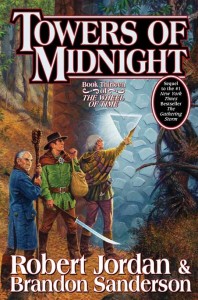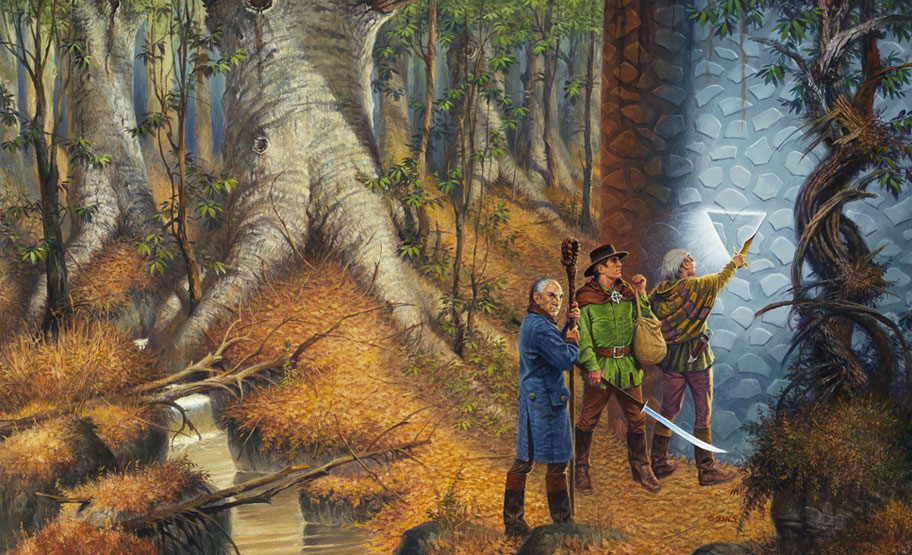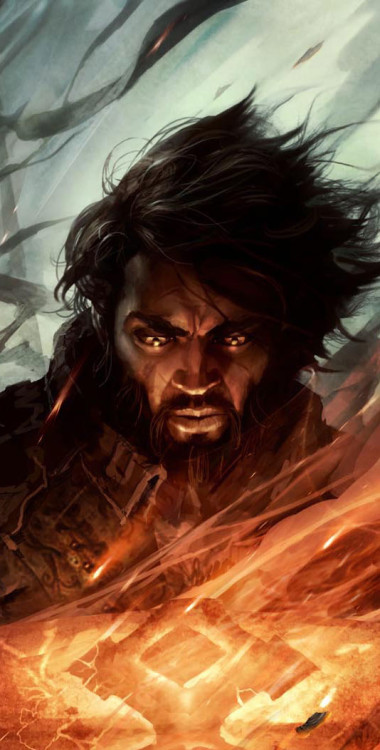
The Wheel of Time turns, and Ages come and pass, leaving memories that become legend. Legends fade to myth, and even myth is long forgotten when the Age that gave it birth comes again.
This quote, which opens the main sequence of every single The Wheel of Time book, can, with some alterations be applied to reading, memory, and the impressions formed (and altered) from the commingling of the above. I am not by nature someone who trusts wholeheartedly my first impressions; too often they change with time and further reflection. I have found this to be the case with this now-thirteen-volume epic fantasy series. When I reviewed the twelfth volume (and the first where Brandon Sanderson wrote most of the material in place of the deceased Robert Jordan), The Gathering Storm, I perhaps was a bit too forgiving of that book’s shortcomings because I reviewed the book after not having read most of the other volumes since 2000. Certainly my memory did not jibe too well with my experiences re-reading the first eleven volumes this past spring and writing commentaries on my impressions. In short, it was a slog re-reading this series. Not merely because of the myriad subplots nor because there were repetitive and yet shallow social commentaries, but also due to the creaky, non-graceful prose and uneven characterizations that often left me feeling cold. Despite the change in authors and the plot developments that one might expect in the penultimate volume of such a ponderous multi-volume series, Towers of Midnight, after some reflection, is a flawed volume in a very flawed series.

Oh, I don’t have to endure the repetitive thoughts on how this male or female PoV character states their bafflement at the opposite sex! Sweet!
Most reviews of a thirteenth volume naturally will be the thoughts of fans (or former fans), intended more for those who are going to read the volume regardless of the reviewer’s reactions than any such essay being targeted toward those who are unfamiliar with the series. When I agreed to receive a review copy and to consider writing a review of this book, I did so largely to see just what my reaction would be to the latest instalment in a series that has diminished in my esteem over the past decade. Interestingly, my initial reaction was mostly a sort of backhanded compliment, something along the lines of “Oh! Sanderson has eschewed having faux bondage scenes in here! And hey! I don’t have to endure the repetitive thoughts on how this male or female PoV character states their bafflement at the opposite sex! Sweet!” rather than being wowed by the mechanics of the story. However, in the interim of time between me receiving a the book and the writing of this review those initial positive reactions have faded while my unease at the structure of this novel increased.
 Doubtless, most fans of the Wheel of Time series are just excited to discover that “stuff happens!” It is true that on a plot level, there are several important reveals that either further or conclude several plot threads, some of which had been left hanging since the earliest volumes of this series. For those that treat this series as merely an extended Wikipedia summary, doubtless the developments here (from the starting of major combat operations up north to battles in the world of dreams and one male character growing a pair and admitting his own nature to a long-expected rescue of a character left for dead eight volumes ago) make Towers of Midnight an exciting must-read for them. But for those readers such as myself who wish there would an elegance to the writing or at least a sound structure that limits herky-jerkiness to a minimum, this book might be one of the most poorly-written volumes in a series that is infamous for its sometimes-execrable prose.
Doubtless, most fans of the Wheel of Time series are just excited to discover that “stuff happens!” It is true that on a plot level, there are several important reveals that either further or conclude several plot threads, some of which had been left hanging since the earliest volumes of this series. For those that treat this series as merely an extended Wikipedia summary, doubtless the developments here (from the starting of major combat operations up north to battles in the world of dreams and one male character growing a pair and admitting his own nature to a long-expected rescue of a character left for dead eight volumes ago) make Towers of Midnight an exciting must-read for them. But for those readers such as myself who wish there would an elegance to the writing or at least a sound structure that limits herky-jerkiness to a minimum, this book might be one of the most poorly-written volumes in a series that is infamous for its sometimes-execrable prose.
In previous reviews, I have noted, if usually in passing, that Sanderson’s prose rarely is more than “serviceable.” There is nothing inherently wrong with aiming for “invisible prose”; I just have different preferences. However, in this volume and much more so than in the previous, Sanderson’s prose inclinations clash noticeably with those scenes originally written by the deceased Jordan. Time after time, there would be several pages or chapters full of prose that is short, staccato, and focused more on getting from Point A to Point B as quickly as possible when suddenly the tone would shift (often, this would be when a character moves to a different locale) and then there would be more ornate descriptive prose. After a while, it became irritating, often because I would be jarred out of my accustomed reading rhythm just so I could process these narrative shifts before the flow would turn back to the staccato rhythms of before.
Jordan’s narrative structure had become unwieldy several volumes before, making it near-impossible for anyone to keep things 100% true.
 Although I am far from a superfan (or WoT-head, as some call those fans who obsess over the minute details of the series), it was irritating to see continuity errors. From how some of the main characters were portrayed (particularly in their interactions with other main characters) to a few of the small details I recalled from re-reading the series a half-year ago, those mistakes in terminology, in characterization, and even in long-established plot lines, these errors contributed to the sense that the writing was uneven at best and poorly-constructed at worst. These faults are not necessarily all Sanderson’s; Jordan’s narrative structure had become unwieldy several volumes before, making it near-impossible for anyone to keep things 100% true to each and every one of those minute developments in plot and character. However, it is telling when they are numerous enough that they grate on someone who doesn’t devote much time at all to thinking about this bloated series.
Although I am far from a superfan (or WoT-head, as some call those fans who obsess over the minute details of the series), it was irritating to see continuity errors. From how some of the main characters were portrayed (particularly in their interactions with other main characters) to a few of the small details I recalled from re-reading the series a half-year ago, those mistakes in terminology, in characterization, and even in long-established plot lines, these errors contributed to the sense that the writing was uneven at best and poorly-constructed at worst. These faults are not necessarily all Sanderson’s; Jordan’s narrative structure had become unwieldy several volumes before, making it near-impossible for anyone to keep things 100% true to each and every one of those minute developments in plot and character. However, it is telling when they are numerous enough that they grate on someone who doesn’t devote much time at all to thinking about this bloated series.
Furthermore, the character developments were often too abrupt. At the end of the last volume, the reader sees the Dragon Reborn’s epiphany on Dragonmount. But when Rand appears first, he has morphed into a sort of messianic figure; there is a sense of falseness that rings in that scene and subsequent ones because it is so jarring and it goes against the grain of the previous few volumes. To a lesser degree, this is seen in Egwene and Perrin’s scenes. Despite writing a nearly 900 page book, Sanderson has written a volume that lacks adequate character transitions. This failure lessens the power of the transformations that do occur in this volume, as they feel flat and less emotional than they perhaps should have been, due to the lack of development that sets up these drastic changes.
One of the most problematic books in the entire series. Recommended only for those who are committed to finishing this series to the (perhaps) bitter end.
This sloppiness and sketchiness even appears in the internal chronology of scenes. Without much in the way of explanation, several subplots in Towers of Midnight are a month or more behind others that were treated in The Gathering Storm. In one memorable moment, the character Tam al’Thor, the adoptive father of Rand, appears in two distinct places (and times) within a span of a handful of chapters, with virtually nothing in the way of referring back to events in the previous volume that set up those situations. It’s the little things like this that dampened my initial enjoyment of this book. Almost every subplot contains these little problems. Individually, they would not effect my reaction to the story, but cumulatively they downgrade Towers of Midnight from an enjoyable addition to the Wheel of Time story to being one of the most problematic books in the entire series. Recommended only for those who are committed to finishing this series to the (perhaps) bitter end.


Yeah we get it. Your too smart and your literary tastes to refined to like the Wheel of Time. Thank god theres only one of these left.
I wouldnt read them but somehow it seems like Aidan is determined to publish these when I wake up whether at 6am or 11am and this is always one of the top 10 items in my reader.
Allow me:
* Your -> You’re
* to refined -> too refined
* theres -> there’s
* wouldnt -> wouldn’t
(I half -expect a “I’m replying from a phone” excuse at this point)
Also, it takes a clever and experienced blogger to know when to publish stuff according to his viewers, followers and readers to maximize exposure. You can’t really blame him for that now, can you?
As for the review, I haven’t read TWoT either but everyone is entitled to their own opinions, as long as they are well argumented and explained. They often come from a subjective point of view (don’t they always?) but that’s the whole point of reviews and that’s why so many people keep visiting this and similar blogs.
As for Sanderson’s effort, and after having read his Mistborn trilogy as well as some shorter stories, I think that sometimes Sanderson is too condident and crafty for his own good. I’m sure another author in his position would probably cut off a few loose plot-ends and then finish the story as smoothly as possible, considering the jumbled mess Jordan left behind. Sanderson probably wanted to leave his own mark in the series. Still this is coming from someone that (I repeat) hasn’t read more than a 100 pages from The Eye of the World so I could be talking out of my ar$e here.
I haven’t read this either but I’ve adored Sanderson’s own work (Mistborn, Elantris, Way of Kings) and though I’d say his prose isn’t a strong point it’s rarely bothered me. Compared to stories where he’s had more control over the plot is this ‘that’ different or similar?
@Antonis It was not a phone but it was just dashed off without checking any spelling.
I have no problem with Larry Nolen not liking the Wheel of Time. Many Many Many people do not. What I take issue with is this 14 article series devoted to hate reading and reviewing. If he wants to write a 14 part essay on the Wheel of Time and why it sucks that would be interesting. But to review a series of books which you obviously dont like and complain about the same things in every fucking review is something that I do not want to read.
This is a blog where I am accustomed to reading higher quality content than this.
Amit,
I’m sorry again that these reviews don’t work for you. Also appreciate that you hold A Dribble of Ink to a high standard.
I feel that Larry’s reviews of the final three Wheel of Time novels, despite their sometime negativity (or perhaps because of it), are some of the most astute analyses of the series available on the web. Regarding the repetition in some of the earlier reviews, I like to think of that as being a meta-fictional comment on some of the ongoing and repeating flaws in the series (which itself is incredibly repetitious and treads water for several volumes.) Whether Larry meant it this way or not, I’m not sure, but it works for me.
One thing that should be noted here is that these are reprints of older reviews of mine: #12, TGS, was reviewed in October 2009; #1-11 and New Spring reviewed over a few weeks in the Spring of 2010; #13 in late 2010; and AMoL reviewed in January 2013. The review styles vary somewhat due to my original aims (#1 to review the first Sanderson WoT book, #2 to write reflective commentaries on #1-11 and New Spring, #3 to review the second Sanderson installment, #4 to review the final volume) and the “repetitions” are more due to the space between these sections than anything intentional. However, that does not mean that my criticisms of one volume cannot be applied to several or that when I underscore something again, that I am thinking of every single volume.
I think it’s been well-established here that Amit’s comments are not those of someone who can provide strong counterpoints to my arguments but of those of an aggrieved fan who does not like to see a beloved work critiqued. Nothing wrong (I suppose ;)) with being a fan, but critiques depend upon the writer putting aside those sentiments.
But looking back on these reviews/commentaries, I don’t think they are among my best work. There just wasn’t as much “meat” to the stories for me to tear into as there were when I was writing pieces on Faulkner and O’Connor and perhaps there is something to be said for reviewing works that engage better the reader within the critic.
I could provide counterpoints. E.g. your inability to see Rands transition from last novel to this isnt a failing of the writers. Its fairly clear what happened there, he went to dragonmount came to terms with being the Dragon, how his brain was acting with both him and Lews Therin in there, how he was turning evil, the nature of what the Dragon is, and he came out of the exerience transformed. To show him struggling with these issues after Dragonmount would dilute the impact of his transformation. I got what I needed out of that for the story. You didnt. And thats fine.
It is your opinion.
Youre welcome to it. You have yours just as I have mine. My point has been and remains that I dont see the point of reviewing every novel and moaning about the same things, i.e. hate reading/reviewing.
Now having said this you are dismissive and insulting towards people who do not share your tastes. Read this paragraph again and tell me your not:
Doubtless, most fans of the Wheel of Time series are just excited to discover that “stuff happens!” It is true that on a plot level, there are several important reveals that either further or conclude several plot threads, some of which had been left hanging since the earliest volumes of this series. For those that treat this series as merely an extended Wikipedia summary, doubtless the developments here (from the starting of major combat operations up north to battles in the world of dreams and one male character growing a pair and admitting his own nature to a long-expected rescue of a character left for dead eight volumes ago) make Towers of Midnight an exciting must-read for them. But for those readers such as myself who wish there would an elegance to the writing or at least a sound structure that limits herky-jerkiness to a minimum, this book might be one of the most poorly-written volumes in a series that is infamous for its sometimes-execrable prose.
This paragraph is mostly insulting to fans of the series and has little to say about the book itself.
De gustibus non est disputandum. That’s it regarding taste. Now for your comments:
Regarding the ephiphany, you argue that showing the internal struggles after that scene would dilute the impact. I on the other hand would note that not only is there a belated discussion of the persona reintegration in the following book but that it flies in the face of RJ’s previous efforts to develop Rand’s crisis of personality in meticulous detail. It would behoove you to (re)read my comments regarding The Path of Daggers where I explicitly note that the author does try to develop his main character’s personality and to explore the traumas that he is experiencing. Sanderson there, just like he did several times in the three books he co-wrote, too frequently fails to develop adequately the foreshadowings and previous character developments in the previous volumes. I did often cite instances in which RJ was maladroit with his characterization choices, but I do not recall castigating him for making underdeveloped leaps in character development. In your rush to try to counterpoint my comment, you fail to defend Sanderson’s choices, instead contenting yourself with the assertion that something was OK for you and thus that it shouldn’t have been a problem for those such as myself who found the gaps in time and character reversions/sudden shifts to be narrative weaknesses. Also, you could have at least cited Jordan’s old blog entries, particularly one of his last ones in which he wrote about how his experiences in Vietnam and the personality crisis he himself experienced helped shape the development of the Rand al’Thor character.
It is easy to dismiss a contrary opinion with pablum such as “hate reading/reviewing,” but the reality often is different. After all, considering that this critic was A) an administrator and moderator at the defunct wotmania site (including for the last two years, a mod for the WoT MB section), B) is at least familiar enough with the deceased writer’s online writings to be very aware of his writings on his wartime experiences and how they shaped WoT’s main character, and C) has stated on occasion (including in several of the commentaries) that he has mixed but not wholly negative reactions to the series, it is hard to see your complaints as being anything more than just those of an outraged fan.
And speaking of the passage that you quote, you choose to find insult in a passage that references a likely divide between those who read a work expecting to love it and those who read a work and hope that it might be enjoyable. Yes, there are several in WoT fandom that loved this volume and the final three, but there are also quite a few who have shared a similar take on the final volumes that I had. You can see this in Dominic’s (he used to write for The Thirteenth Depository, one of the leading WoT blogs/resource sites) comments to the original 2010 review. So with that, I’ll leave you to read those and react accordingly.